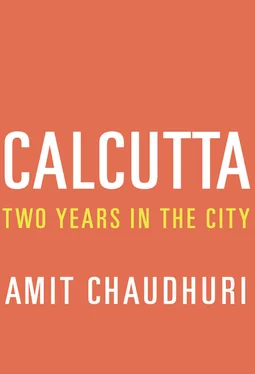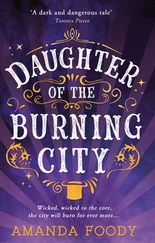Inder Kumar informed me it was seventeen years since he left a place called Mohammedpur in Bihar; that he went back monthly to be with his family; that he had two children in school, a son and a younger daughter; that he was employed by a contractor, who presumably let him keep a fixed amount of his parking collections and pocketed the rest. During this staccato construction, another was listening, someone unlike the people here (who avoid my glances in case I start to pry). He, instead, was more like one of those figures on the far edge of the screen when a random “member of the public” is being interviewed on a news channel — the one with the restive expression, as if he has a vital opinion to add. This man was, it turned out, Mohammed Khan; excessively wiry and red-eyed, though he clearly wasn’t ill. That much was certain because of his manner (physically, he might have fallen down any minute), which was, in contrast to the others, vociferous and ironic. Some part of him viewed the street, even himself, at one remove, and that made him more demonstrative and engaged — over-engaged, almost — than either Inder Kumar or Nagendra. The conversation, now, quickly and without warning, veered towards politics; how exactly this happened I don’t know, though I think it had something to do with Mohammed Khan’s wide-ranging passions; his candidness; his loose-cannon manner. “You can call me Mataal,” he added matter-of-factly; and, soon, I found that everyone knew him by this name. He said it without embarrassment — the word means “drunk” (and now his red eyes and frail outline made sense), but it also has positive connotations: in devotionals, mystics will often refer to themselves as “matwala”—inebriated in soul and spirit with God. Mataal said he was definitely voting Trinamool — the main opposition to the ruling Left Front — when the time came. This set off an echo in the group, and everybody around us, including Inder Kumar and Nagendra, confirmed that it would be Trinamool for them too.
I wasn’t shocked by this absolute consensus; the historical moment (August 2009) was one in which the tide appeared to have turned after thirty-two near-unchallenged years of the Left-led government. Still, I was a bit surprised. After all, the Left Front had largely created the improvised universe in which Nagendra and Inder Kumar and Ramayan Shah survived, and I mean this on several levels. There was the pro-poor, pro-labour rhetoric of the Communist Party of India (Marxist), of course, heard until recently from a megaphone on every street corner; and the preponderant ideology of hammer and sickle that made this gradual colonisation of pavement and bus stop as potential shelter or spaces for trade possible. The fact that this ideology had once been embraced by almost every intellectual as well as moral person in Calcutta meant there could be no viable protests against these conditions, in which, through low-level corruption and a peculiar notion of patronage, generosity, and humanity, homeless families and illegal businesses were allowed to proliferate in various available public spaces. Perhaps that notion of humanity wasn’t so peculiar really; one felt its deep pull as one walked on the streets and sat among their unexpected range of inhabitants. But the ethical person, the intellectual, who wouldn’t say a word against these conditions in public, cultivated, actually, a hypocrisy that was apparent everywhere. Still, the middle class had swung decisively towards the Trinamool Congress long ago, and each time been disappointed by its volatile leader Mamata Banerjee’s endemic mood swings, her violent unpredictability of policy, her missionary populism, the way she frequently threatened, out of a sense of sheer pique, to self-destruct. Gandhi had perfected the art of fasting, emaciation, and self-flagellation as a tool; Mamata Banerjee, to the nervousness of her supporters, was on her way to becoming the mistress of self-destruction, of swiftly attacking the nose because of a perceived slight from the face. Still, the state of the state of West Bengal was such that it was ready to have her as its leader; not just Nagendra and Inder Kumar, but even the members of the Bengal Club and the diners in Mocambo were in unison on this. Worryingly, there was no clarity, about not only what to expect from Ms. Banerjee, but whom she represented — was it the masses, or the middle class, or industry, or, impossibly, everyone and everything? The answer was elusive. That she’s single, and always wears a simple white cotton sari — a sign of abnegation — perhaps denoted she would take everyone, from Inder Kumar to the man ordering chicken Tetrazzini in Mocambo, under her wing. Revulsion against the Left Front had permeated everything; Mataal and Nagendra and Inder Kumar gave their assent to this feeling. And yet the Front had created the mood in Calcutta that greeted the largely unskilled labour such as themselves, arriving here daily from a neighbouring state — what might have been a mood of parochial animosity was, instead, one of absorption and, to a certain extent, of abetment. But, whether you live and sleep and dream in a condominium in South City or on a bench on the pavement, you feel unsafe when you begin to sense that an epoch is dusted and finished. I turned to Mataal after everyone had expressed their unequivocal opinion, and asked my stock question—“What do you do?”—for it combines sociological rigour with an assumption of concern and friendliness. For the first time, he prevaricated; but his acquaintances were ready to help him out. “He supplies women,” said one of them; and others found other words to describe his profession. “Really?” I said, “Achha?” because the pimps of Free School Street used to be well known; but I’d presumed that in a post-HIV world Mataal’s trade and the core trade of prostitution itself would have suffered, here, a terminal body blow. I was told otherwise. “I have many parties,” Mataal corrected me, making me catch a glimmer of an unknown world. “All kinds of people.” He looked vacant, for our conversation had abruptly come to an end. “In fact, I have to meet a party right now.”
Finally, one afternoon, I got to see Ramayan Shah: he was squatting near the edge of the pavement, not far from the gutter, surveying his world — the pot and its ingredients — with a masterful but concerned air (a gaze like a chemist’s) before embarking on the cooking itself. I, in a sense, already knew him; he, of course, not only didn’t know me but, as I stood behind him, showed no awareness I existed. He’d created his own universe, like a spider makes its web, and — though that universe may be invisible to the passer-by — he was far more centred in it than anyone I’d met over here. “Is this your shop?” I asked — how easy it is to assume the role of a questioner as long as you look the part — and “What is your name?” He seemed vaguely startled; then, his consciousness quickly recovered its continuity with its surroundings, and I didn’t really matter. The way he said his name softly made me think he was Muslim, and when I repeated what I thought I’d heard—“Rahman Shah”—he nodded in unworldly agreement, as if names and identities and details itself were dispensable. Only later did I guess — from talking to others — that he’d said Ramayan, not Rahman. He seemed older than his years: I presumed he was in his mid-fifties, but he looked closer to his early sixties. He had a thin grey moustache and a forbearing face; in his much-worn dhuti and kurta, he was like the North Indian peasant he was probably meant to be, resilient, adaptable. Agreement with everyone and everything, I sensed, was his tested strategy for survival — no wonder he’d let my mispronunciation of his name go; no wonder he hadn’t acknowledged I was standing behind him — it was not so much out of a wish not to be encroached upon as to not interfere, to not encroach upon. And this air of ready-made agreement gave Ramayan Shah a quality — perhaps deceptive, perhaps not — of innocence. It strikes me now, as I think of him, diligent on his haunches, that Gandhi’s mass movement must have been full of recruits exactly like him. How that galvanisation had once occurred was now mysterious.
Читать дальше












